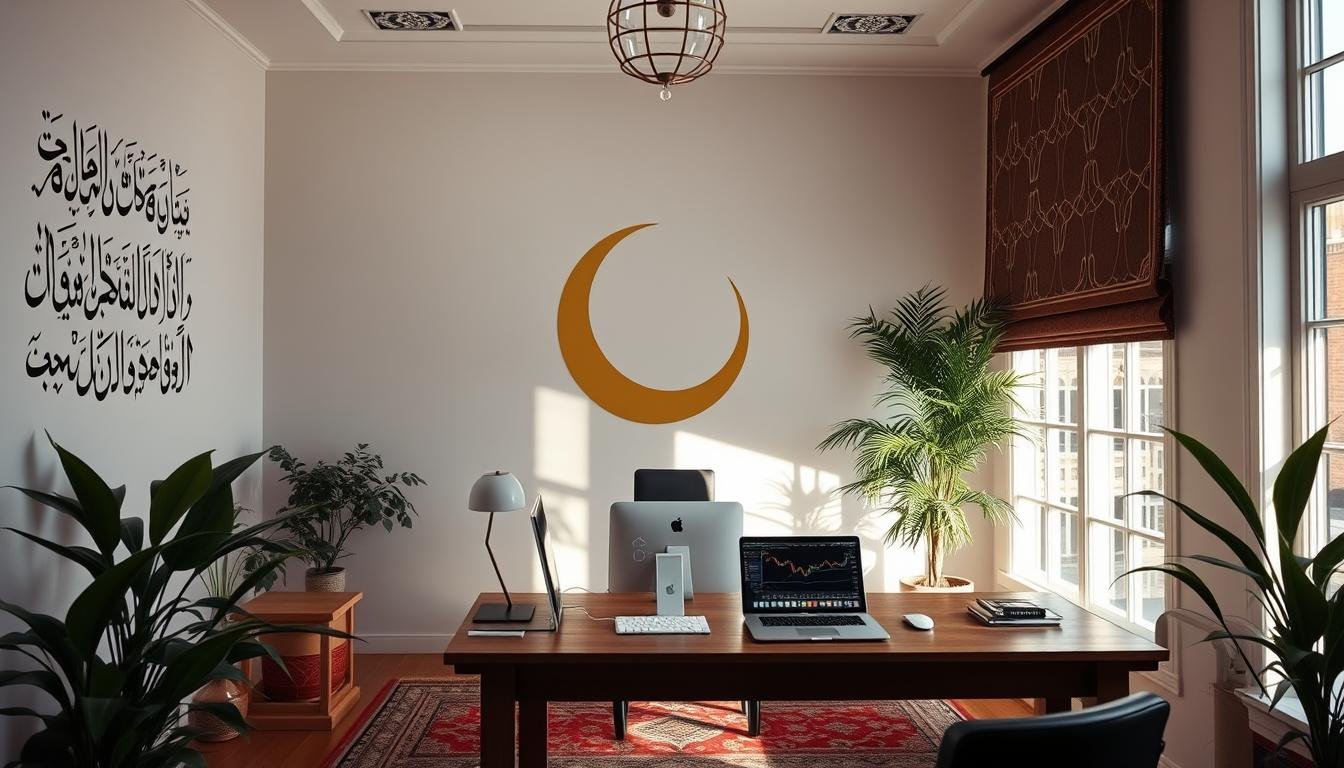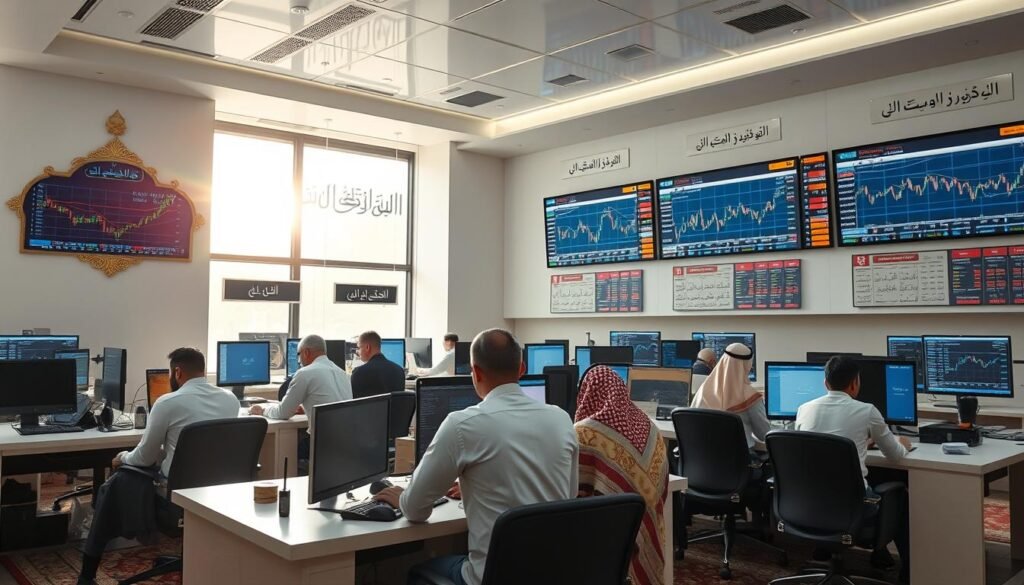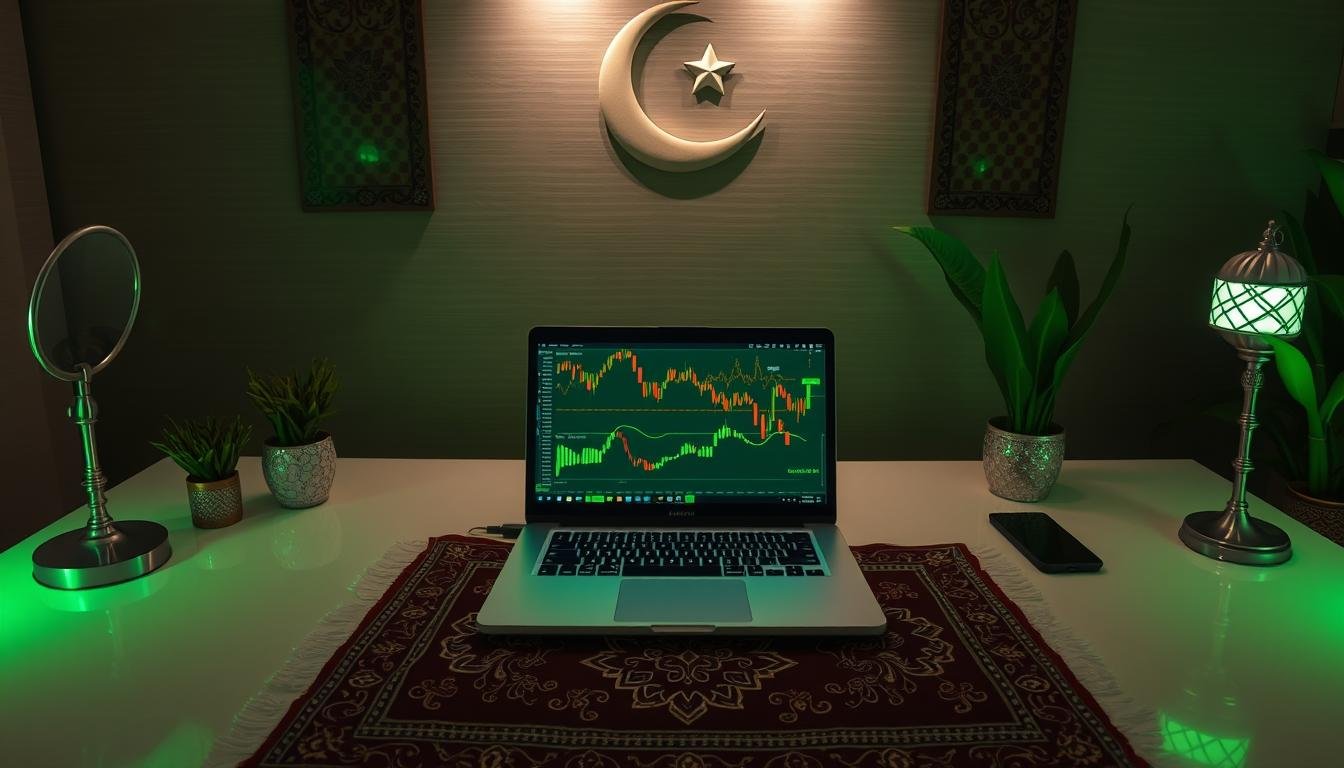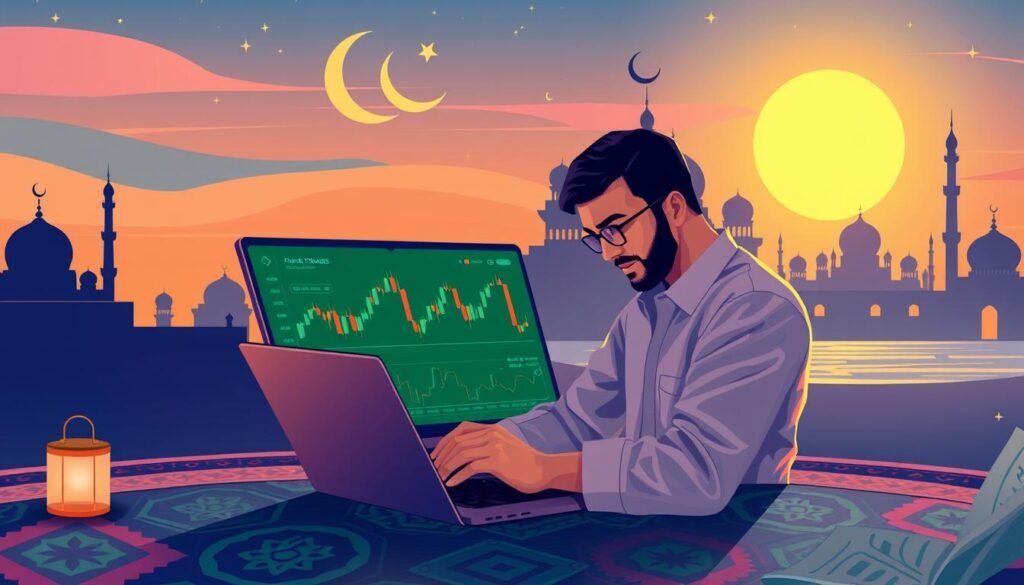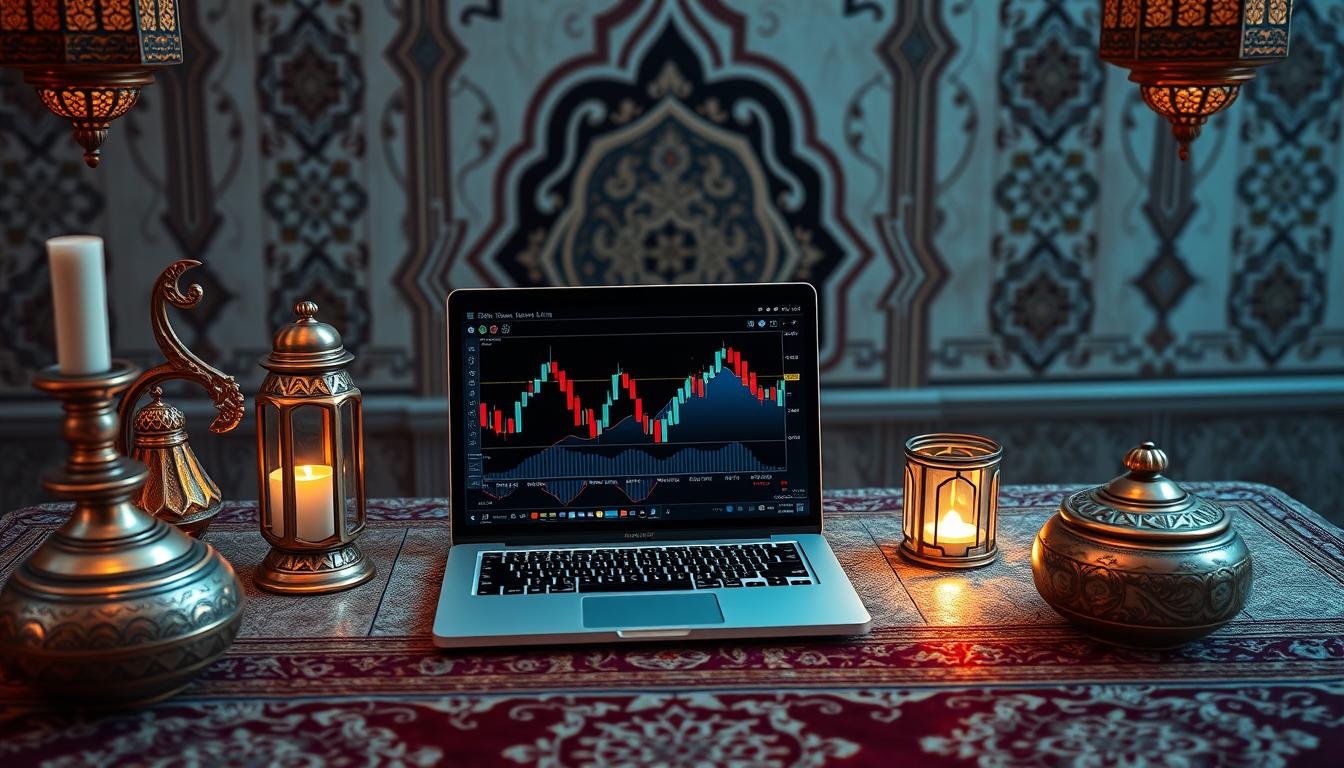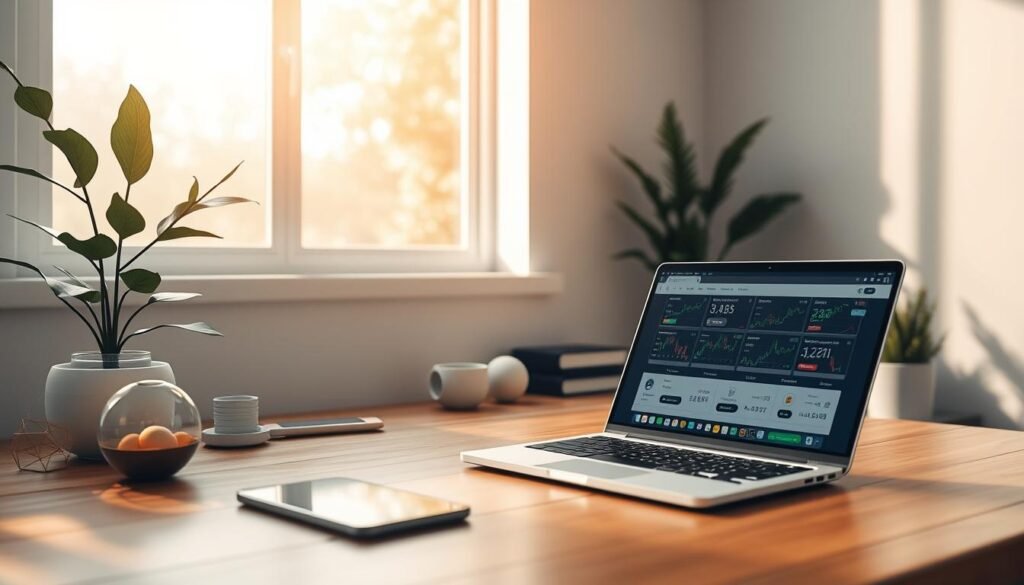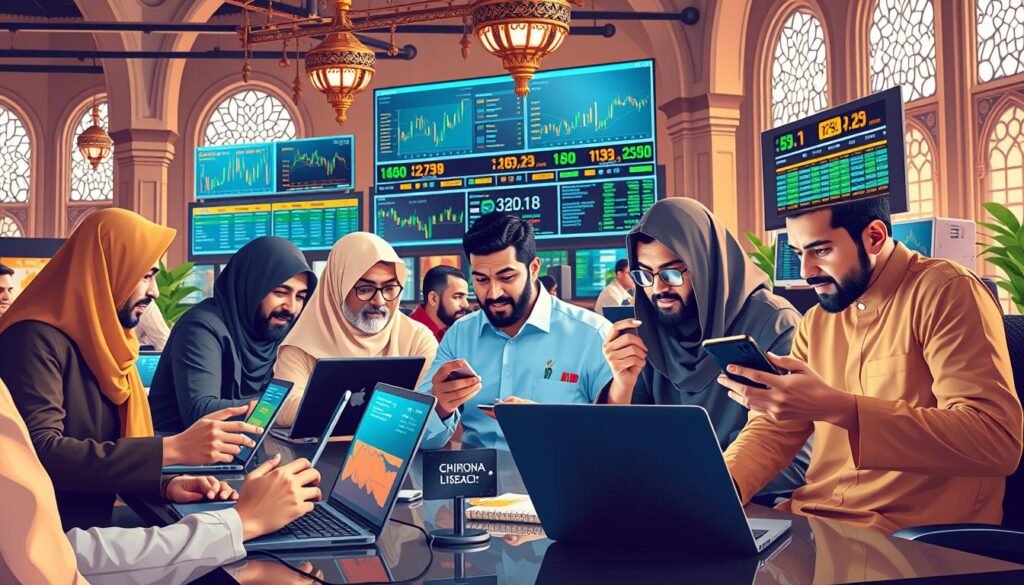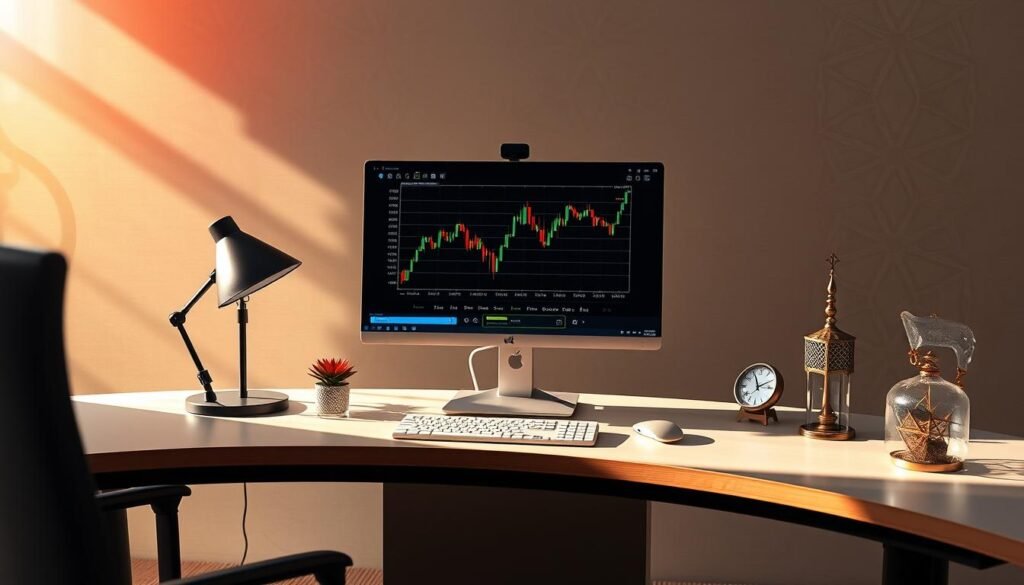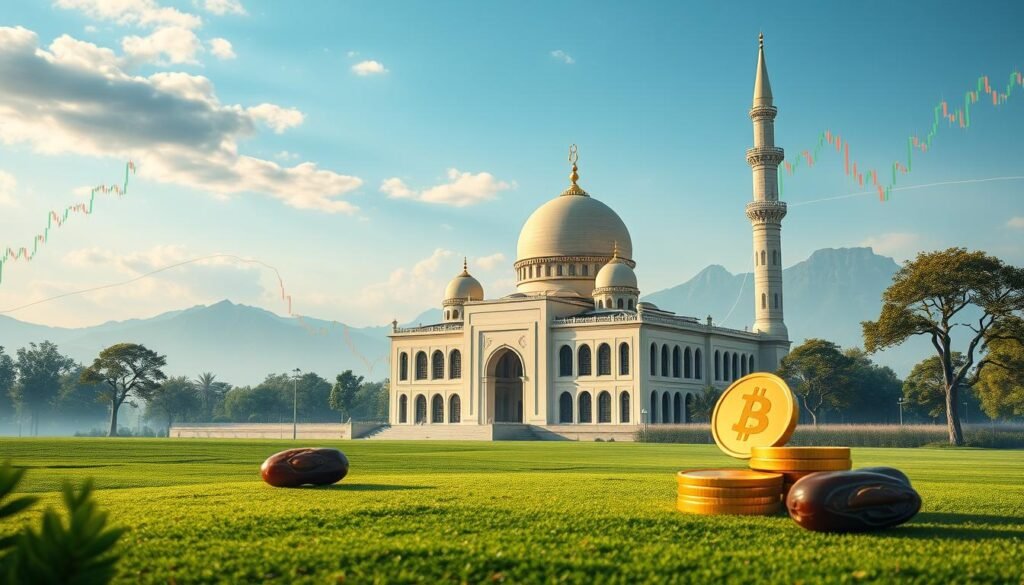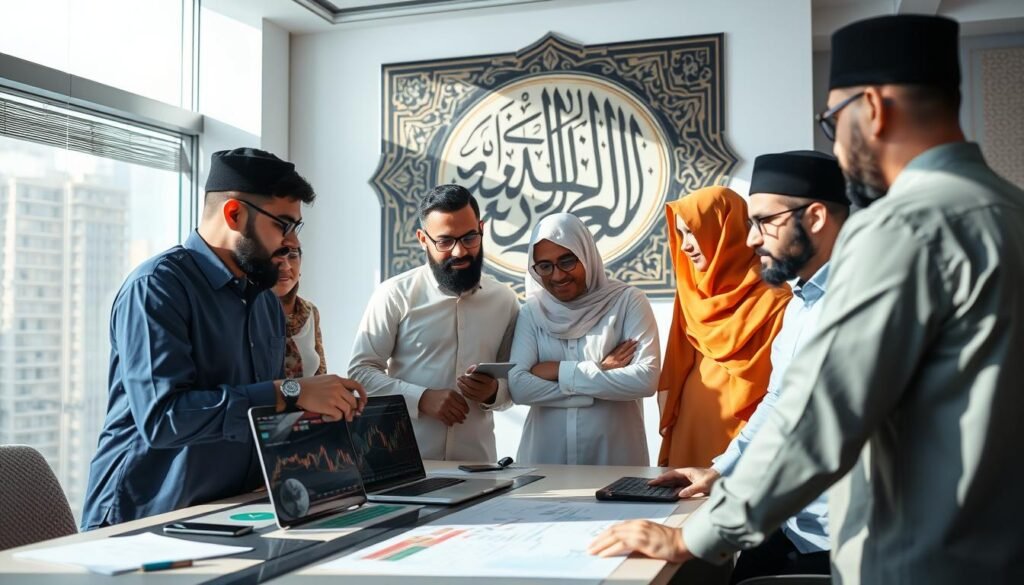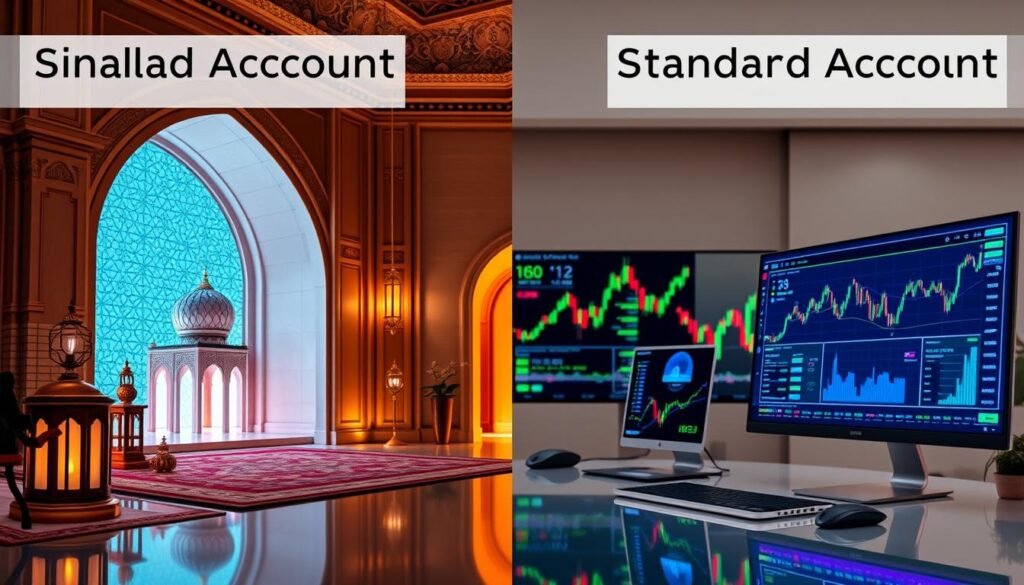Islamic Forex Accounts: Halal Trading Options
In today’s global world, Islamic forex accounts let people follow Islamic finance rules. They can trade in the forex market without breaking Islamic laws. These accounts don’t use interest, or riba, which is banned in Islam. They also make sure all trades are done in a way that’s fair and right, following Islamic values.
What makes Islamic forex accounts special is they follow Sharia law. They are different from regular trading accounts because they focus on doing the right thing. They are open and fair. If you’re into trading or just starting, knowing about these accounts can help you make choices that fit your faith.
Key Takeaways
- Islamic forex accounts align with Islamic finance principles, providing an ethical trading solution.
- They avoid interest or riba, ensuring compliance with Sharia law.
- Halal trading options focus on ethical and transparent transactions.
- These accounts cater to the unique needs of Muslim investors.
- Understanding the mechanisms and benefits of sharia-compliant forex trading is crucial for faith-aligned investments.
Understanding Islamic Forex Accounts
Islamic forex accounts are for Muslim traders who want to trade forex but follow their faith. They stick to Sharia law, which bans certain financial acts seen as wrong. This means they avoid haram, or forbidden, transactions.
Definition and Features
Islamic forex accounts, also known as swap-free accounts, don’t charge interest on overnight trades. This is because Islam forbids riba, or interest. These accounts have special features:
- No swap or rollover interest on overnight positions
- Immediate execution of transactions without any delay
- No commission charges on trades, ensuring only halal earnings
The Importance of Sharia Compliance
Sharia compliance is very important in Islamic forex trading. It makes sure economic actions are fair, equal, and ethical. These values are key in Islamic finance.
Islamic forex accounts and sharia-compliant features let Muslim traders trade with confidence. They know their money is being used in a way that respects their faith.
The Principles of Islamic Finance in Forex Trading
Islamic finance is based on not allowing interest, or “riba.” This ensures that money dealings follow Sharia law. These rules are key for fairness and justice in trading, especially in forex where currency exchange must follow these standards.
Prohibition of Riba
The rule against riba is central to Islamic finance. It stops exploitation and makes sure currency trades are fair. Trades must be direct and clear, with profits from real work, not just interest.
This way, fairness and equality are kept, stopping unfair gains or harm.
Emphasis on Ethical Investments
Islamic finance also stresses the importance of ethical trading. This means that the money and financial tools used should not support things against Islamic values. For example, alcohol, gambling, or weapons.
Instead, it encourages investments in areas that help society and are good for people.
| Islamic Forex Trading Principles | Conventional Forex Trading |
|---|---|
| Prohibition of Riba | Interest-based earnings allowed |
| Emphasis on Ethical Investments | No restrictions on investment sectors |
| Sharia Compliance | No religious compliance required |
“In adherence to Islamic finance principles, forex trading must avoid riba and focus on ethical investments.”
Interest-Free Forex Trading
Interest-free forex trading is key for those following Islamic principles. It uses special accounts that follow sharia law. These accounts make sure no swap or rollover interest is charged.
How It Works
Interest-free forex trading uses Islamic forex accounts. These accounts avoid any interest, known as riba. Instead of earning interest on overnight positions, they settle trades the same day.
They also use agreements that don’t involve interest. This way, they stick to Islamic financial laws.
Advantages for Muslim Investors
The main advantages for Muslim investors in interest-free forex trading are clear. They can invest in markets without going against their beliefs. These accounts also offer sharia-compliant trading benefits.
These benefits include focusing on ethical investments and avoiding too much speculation. This makes trading more in line with Islamic values.
| Aspect | Conventional Forex Accounts | Islamic Forex Accounts |
|---|---|---|
| Interest | Involves swap and rollover interest | No swap or rollover interest |
| Compliance | Not necessarily sharia-compliant | Fully sharia-compliant |
| Investments | May involve unethical investments | Promotes ethical investments |
Differentiating Between Conventional and Islamic Forex Accounts
It’s important to know the key differences between conventional and Islamic forex accounts. This is especially true for traders who want to follow their ethical and religious beliefs. Each type of account has its own rules and features, catering to different trading needs.
Key Differences
One big key difference is how interest, or riba, is treated. Conventional accounts often use interest-bearing loans for leverage. On the other hand, Islamic accounts do not charge or pay interest. They also follow Sharia law strictly, which affects the types of contracts allowed.
Pros and Cons
Both account types have their own pros and cons. Islamic accounts offer a halal trading experience but might have different fees or restrictions. Conventional accounts, however, provide more flexibility and leverage, but they involve interest.
Popular Muslim-Friendly Brokerage Services
Muslim-friendly brokerage services are becoming more popular. They offer halal trading options. These services make sure their platforms follow Sharia law, allowing for ethical trading.
Top Brokers Offering Islamic Accounts
Many top brokers are dedicated to Islamic accounts. They provide high-quality options:
- IG Group: IG is known for its strong platform and following rules. It offers Islamic accounts that meet Sharia standards.
- XM: XM is famous for its great customer service and learning tools. It’s a top pick for Muslim traders.
- AvaTrade: AvaTrade uses the latest technology and has swap-free options for Islamic traders.
Criteria for Choosing a Broker
Choosing the right broker is important. Look for these key points:
- Account Features: Make sure the broker has swap-free accounts and follows Sharia law.
- Transparency: Choose brokers with clear fees and information.
- Regulatory Compliance: Check if the broker is overseen by trusted financial bodies.
By considering these points, Muslim investors can find brokers that meet their financial and Islamic needs.
The Role of Swap-Free Accounts in Islamic Forex
Swap-free accounts are key in Islamic forex trading. They let Muslims trade currencies without breaking Sharia law. Traditional accounts have interest fees, which Sharia law forbids.

Swap-free accounts work by not charging interest. Instead, they might ask for a small fee or change the spread. This way, they keep trading profitable for brokers and follow Islamic finance rules.
The significance of swap-free accounts is huge. They offer a way for Muslims to trade ethically. This lets more Muslims join the global forex markets, making it more diverse.
Swap-free accounts also help the whole market. They make trading fairer and more stable. This attracts more investors who care about ethics, helping the market grow stronger.
| Feature | Conventional Accounts | Swap-Free Accounts |
|---|---|---|
| Overnight Interest | Applied | None |
| Sharia Compliance | No | Yes |
| Administrative Fees | No | Possibly |
| Market Inclusivity | Limited | Enhanced |
Zakat-Compliant Investments through Forex Trading
For Muslims trading in forex, it’s key to make sure their investments follow Zakat rules. They need to understand Zakat in forex and its ethical side. Zakat is a big part of Islam, so following it is important for keeping trading honest and right.
Understanding Zakat
Zakat is a way to give to those in need and is very important in Islam. It makes sure everyone has a fair chance and helps keep society balanced. For forex traders, understanding Zakat in forex is crucial to make sure profits are clean and follow Islamic law.
Calculating Zakat on Forex Earnings
To make sure investments are Zakat-compliant, traders must carefully track their profits. They need to figure out how much of their earnings to give to Zakat, usually 2.5%. This can change based on the currencies traded and the trader’s income. But the main idea is to give a part of what you earn to those who need it more.
By following these steps, Muslim traders can keep their faith while trading in the forex market. Zakat-compliant investments not only meet religious duties but also help the community and encourage ethical growth.
Steps to Open an Islamic Forex Account
Opening an Islamic forex account follows Sharia principles, unlike regular trading accounts. Here are the steps to open one successfully.
Eligibility Criteria
To open Islamic forex accounts, you need to meet certain criteria. You must:
- Be a practicing Muslim
- Trade in a way that follows Sharia law
- Provide a declaration of faith if the broker asks for it
Documentation Required
When you apply for an Islamic forex account, you’ll need to provide some documents. These might include:
- A valid government ID (like a passport or driver’s license)
- Proof of where you live (like a utility bill or bank statement)
- A filled-out application form that shows you follow ethical trading
Account Setup Process
- Find a broker that offers Islamic accounts and follows Sharia law.
- Complete the Islamic account application form carefully.
- Send in the ID documents for verification.
- After approval, put money into your account and start trading ethically.
Knowing what you need to open an Islamic account and getting your documents ready makes things easier. By following these steps, you can trade ethically and in line with Sharia principles.
Managing Risk in Halal Investment Accounts
Managing risk in halal accounts is key to successful forex trading. It makes sure investments follow Sharia principles and reduce financial risk. Using risk management strategies made for Islamic rules is vital for traders. It helps keep profits and stay true to ethical values.

Risk Management Strategies
Effective risk management for halal accounts includes several techniques. These help lower the chance of losing money. Some of these are:
- Setting Stop-Loss Orders: This tool helps by getting out of trades when they hit a loss limit.
- Diversification: Spreading investments across different types of assets helps avoid big losses.
- Position Sizing: This means controlling how big each trade is compared to your total portfolio. It helps avoid too much risk.
- Avoidance of Speculative Investments: Following Sharia law means avoiding risky trades that are not allowed.
Tools and Resources
Using the right tools for Islamic forex trading can improve risk management. It also makes sure trading follows halal rules. Some tools and resources include:
- Islamic Trading Platforms: Pick platforms that meet Sharia-compliant trading needs, like MetaTrader 4 with Islamic account options.
- Financial Analysis Software: Use software to analyze market trends and help make decisions without forbidden activities.
- Educational Resources: Get webinars, courses, and expert advice on managing risk in halal accounts.
By using these strategies and tools, traders can manage risk well in halal investment accounts. This ensures their trading is both smart and follows Islamic principles.
Common Misconceptions about Islamic Forex Trading
Many people misunderstand Islamic forex trading. This makes it hard for them to try it. We will clear up two big misunderstandings in this section.
Misconception 1: It’s Unethical
Some think Islamic forex trading is wrong because it’s speculative. But, Islamic forex accounts follow Sharia rules. They make sure trading is fair and clear, fitting Muslim beliefs.
Misconception 2: It’s the Same as Conventional Trading
Many believe Islamic forex accounts are just like regular trading accounts. But, that’s not true. Islamic accounts don’t earn or pay interest. They also need real assets or services to trade, showing they’re different and ethical.
Economic Benefits of Sharia-Compliant Trading
Sharia-compliant trading brings big economic wins. It goes beyond helping traders to benefiting the whole world. It’s all about fairness and doing the right thing, leading to lasting financial growth.
Promoting Economic Justice
One key benefit is promoting economic justice. Sharia trading bans things like interest (riba). This makes sure wealth is shared fairly. It also makes financial dealings open and fair, creating a welcoming space for everyone.
Encouraging Ethical Investments
Sharia trading pushes for ethical forex investments. It makes sure trading doesn’t hurt people. This means no money goes to bad industries like gambling or alcohol.
This leads to better economic health and stability. Sharia-compliant trading is all about fairness and using resources wisely. It helps build a stronger, fairer economy for everyone.
Islamic Forex Accounts vs. Halal Investment Accounts
Islamic forex accounts and halal investment accounts are often confused with each other. But they serve different needs in Sharia-compliant trading and investing. Islamic forex accounts focus on forex trading without interest (riba) and fair deals. Halal investment accounts, on the other hand, cover a wide range of investments like stocks, mutual funds, and real estate, following strict Sharia law.
Islamic forex accounts mainly deal with foreign exchange, avoiding interest and speculation. Halal investment accounts, however, offer a variety of financial products that meet Islamic standards. This variety lets Muslim investors grow their portfolios while staying true to their faith.
Deciding between Islamic forex accounts and halal investment accounts depends on your financial goals and risk level. If you’re into the fast-paced world of forex, an Islamic forex account might be better. But if you’re looking for long-term growth, halal investment accounts could be more suitable. Knowing the differences helps make choices that respect both your financial goals and religious beliefs.
FAQ
What are Islamic Forex Accounts?
Islamic forex accounts are for people who follow Islamic finance. They offer trading options that follow Sharia law. This means no interest and ethical trading.
How are Islamic Forex Accounts Sharia-compliant?
They follow Sharia law by not charging interest overnight. Trades are done right away without delay. This makes trading fair and in line with Islamic laws.
Why is Riba prohibited in Islamic Forex Trading?
Riba, or interest, is banned because it’s seen as unfair. Islamic trading removes interest. This makes trading fair and just.
What are the advantages of interest-free forex trading for Muslim investors?
It lets Muslim investors trade without breaking their faith. It avoids interest and focuses on ethical investing. This is good for those following Islamic laws.
What are the key differences between conventional and Islamic forex accounts?
Islamic accounts don’t have interest and are swap-free. Conventional accounts have interest and different fees. This shows the main differences.
Which brokerage services offer Islamic forex accounts?
Brokers like XM, IG Markets, and AvaTrade offer Islamic accounts. They are known for their technology and following Islamic finance.
How do swap-free accounts benefit Islamic forex traders?
Swap-free accounts remove overnight interest. This makes trading Sharia-compliant. It lets Muslim traders trade ethically without breaking their beliefs.
How is Zakat calculated on forex earnings?
Zakat is 2.5% of trading profits after expenses. Traders must follow Islamic rules to pay Zakat correctly.
What are the steps to open an Islamic forex account?
To open one, you need to declare your faith and provide documents. The application process checks for Sharia compliance.
How can risks be managed in halal investment accounts?
Use tools like stop-loss orders and avoid speculative trades. Sticking to Islamic rules is key to managing risks.
What are common misconceptions about Islamic forex trading?
Some think it’s not ethical or the same as regular trading. But Islamic accounts are structured to be ethical and avoid interest.
What are the economic benefits of Sharia-compliant trading?
It promotes fairness, transparency, and ethical investing. It supports ethical businesses and a stable financial environment.
How do Islamic forex accounts differ from halal investment accounts?
Islamic forex accounts focus on currency trading without interest. Halal investment accounts cover more areas, following Islamic rules for different assets.
